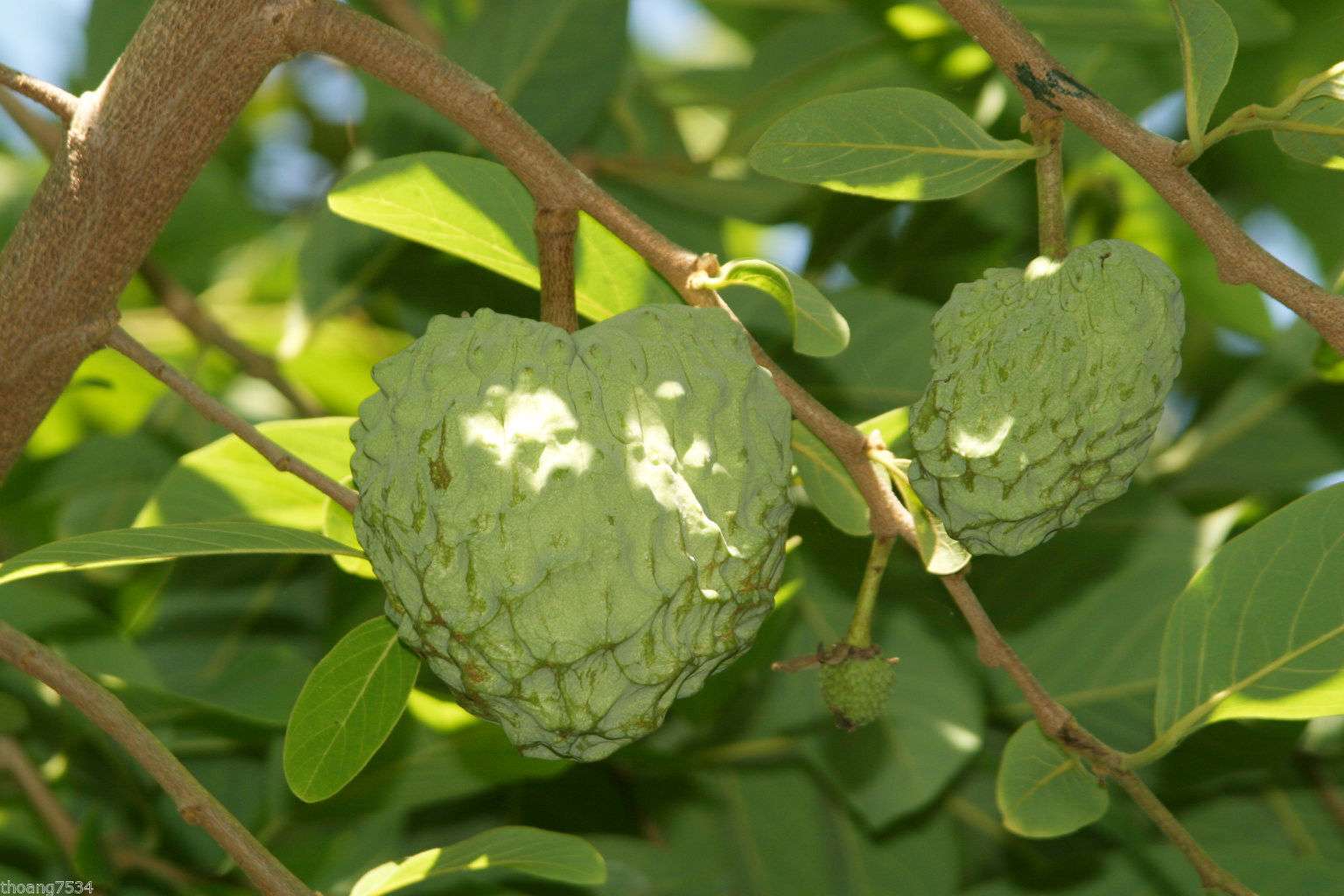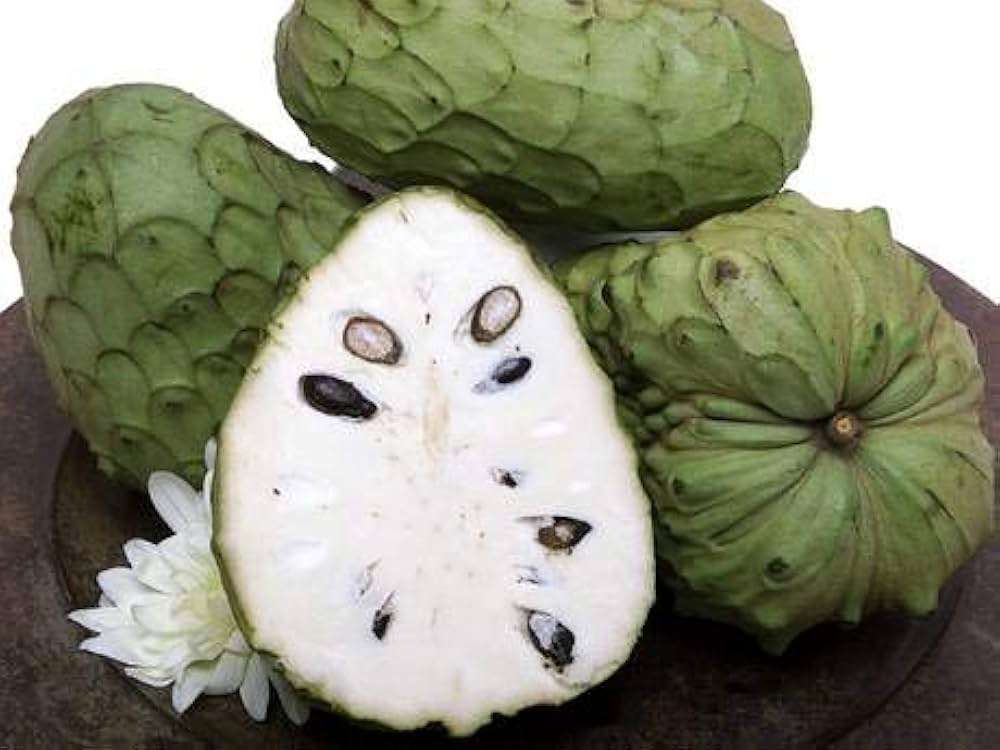Differences between Cherimoya with Soursop
Differences between Cherimoya with Soursop
Soursop and Cherimoya are both favored by their taste. But, what makes these two fruits that share the same family but are considered two different fruits? What is differrent in the nutritional value of each type?
Soursop or graviola (guanábana in Spanish) and cherimoya (chirimoya or chirimoyo also in Spanish), are two different tropical fruits that are often confused with each other. They both belong to the same Family - Annonaceae, and are physically similar. However they both have very important differences that set them as two different fruits.

Cherimoya
.jpg)
Soursop
We've put together a list for you to compare:
| Cherimoya Scientific name: Annona cherimola |
Soursop Scientific name: Annona muricata |
| Cherimoya is a tropical, heart-shaped fruit. Its size goes from small to medium, like as an apple size. Its skin is smooth, thin and dark green. Cherimoya does not have thorns or spines unlike soursop. It has demarcation lines between the fruit segments that form. The flesh inside the fruit is white and smooth. | Soursop is a big fruit, about the size of a grapefruit. In average, soursop weighs about 2.5kg. Its skin is usually dark green, which can vary between light green and yellow green. Its skin is thin, soft and flexible spines on it. The flesh inside the fruit is white. Its texture can be described as smooth, thick, and creamy. |
| Cherimoya has a mild sweet taste. Its flavor is described as a flavor combination of 3 kind of fruit: pineapple, strawberry and mango. | Soursop has a sweet taste although its sourness more predominates. Its flavor is described as a blend of strawberry and apple. |
| Cherimoya is high on proteins. This specific characteristic nutritionally differentiates it from other fruits. It is also high on thiamine (vitamin B1), calcium, iron and phosphorus. | Nutritionally, soursop is rich in ascorbic acid (vitamin C), thiamine (vitamin B1), iron, magnesium, and potassium. But it contains less Vitamin B6 than Cherimoya. |
| Cherimoya is original from Peru, Ecuador, Bolivia and Colombia. Nowadays it can be found in Mexico, and many other countries in Central and South America. Other countries such as Spain and the USA and regions like the Mediterranean and Central Africa also produce cherimoya. | Soursop is native to Southern Mexico, Central and South America, and the Caribbean. Today, they invade both tropical and subtropical climates around the world. They have different names in different regions: guanábana in Spain, catuche in Venezuela, or sirsak in Indonesia. |

Cherimoya
.jpg)
Soursop
WHY SAY SOURSOP IS BETTER THAN CHERIMOYA?
Below is a comparison table of nutritional values in 100g of each kind of fruit
General values:
| In 100g of Cherimoya or Soursop contains | Cherimoya | Soursop |
| Proteins Proteins are essential for a healthy, balanced diet. The recommended daily dose is 0.8 -1g of protein per 1 kg of body weight. |
1.57g | 1g |
| Water content Foods with high water content help you stay hydrated. Water also helps transport nutrients and oxygen throughout the body. |
79.39g | 81.16g |
| Energy The amount of food energy in kilocalories (kcal) per 100g. The minimum daily requirement is approximately 1,800 kcal (according to the Food and Agriculture Organization of the United Nations). |
75Kcal | 66Kcal |
| Fiber Dietary fiber, also called roughage, is present in plants, in soluble or insoluble form. Eating fruits, vegetables and whole grains rich in fiber helps the digestion process. |
3g | 3.3g |
| Lipids Lipids are essential for a healthy, balanced diet. They provide energy and also play a key role in the production of hormones and cell membranes, as well as in the absorption of nutrients and fat-soluble vitamins. |
0.68g | 0.3g |
| Polyunsaturated fatty acids A form of unsaturated fat with more than one double bond in its structure. Unsaturated fats are usually healthy fatty acids, increasing good cholesterol and decreasing bad cholesterol. |
0.19g | 0.07g |
| Saturated fatty acids Saturated fats are the unhealthy fatty acids that produce bad cholesterol and increase the risk of strokes and heart attacks. They come in high amounts from meat and dairy products. |
0.23g | 0.05g |
| Choline Choline is essential for the production of cellular membranes and plays a crucial role in acetylcholine synthesis and cholinergic neurotransmission. |
7.6mg |
Sugars:
| In 100g of Cherimoya or Soursop contains | Cherimoya | Soursop |
| The glycemic index (GI) The glycemic index (GI) is used to measure how much foods affect blood sugar levels. Foods can be low, medium, or high-glycemic foods and are ranked on a scale of 0–100. The lower the GI of a specific food, the less it should affect blood sugar levels. |
59 | 32 |
| Sugars (total) The total amount of sugars, including glucose, fructose, galactose, sucrose, lactose, maltose, and trehalose. A sugar-heavy diet can cause metabolic dysfunctions. |
12.87g | 13.54g |
| Fructose Fructose also called fruit sugar, is a monosaccharide which is absorbed directly into the bloodstream. Consuming too much fructose can cause high blood pressure. |
6.28g | |
| Glucose Glucose also known as blood sugar, is the main source of energy. |
5.93g | |
| Sucrose Sucrose also known as table sugar, is composed out of glucose and fructose. Sucrose is rich in calories, but doesn’t have a high nutritional value. |
0.66g | |
| Carbohydrates Carbohydrates are composed of carbon, oxygen and hydrogen, and are divided in 4 groups: oligosaccharides (glycose), monosaccharides and disaccharides which are sugars and serve as a quick source of energy, while polysaccharides, like starches serve for storing energy. |
17.71g | 17.71g |
Minerals:
| In 100g of Cherimoya or Soursop contains | Cherimoya | Soursop |
| Iron It is found in hemoglobin, which represents approximately 2 thirds of the body's iron reserve. |
0.27mg | 0.60mg |
| Magnesium It is an important mineral for bone development and helps the proper functioning of various metabolic processes, like activating the enzymes that help in energy production. |
17mg | 21mg |
| Phosphorus Phosphorus is the second most abundant mineral found in the human body, after calcium. It helps cellular reproduction and contributes to the growth and repair of tissues. |
26mg | 27mg |
| Calcium It is a mineral which is very important for bone health. The recommended daily dose for adults is approximately 1000mg. |
10mg | 14mg |
| Manganese Manganese is a trace mineral that assists in bone formation, skin integrity and assists the enzymes that control blood sugar. |
0.09mg | |
| Sodium It helps regulate the water level in the cells, especially in the kidneys. The amount of sodium consumed also influences blood pressure. |
7mg | 14mg |
| Zinc Zinc plays an important part in cell division and in strengthening the immune system. |
0.16mg | 0.10mg |
| Copper It is an essential trace mineral that helps in the formation of collagen and elastin, which are essential for tissue and bone integrity. |
0.07mg | 0.09mg |
| Selenium Selenium is an important mineral with antioxidant properties. It helps the body's detoxification system and strengthens the immune system. |
0.6µg | |
| Potassium It is a mineral that helps muscles contract, Regulates the fluid balance in the body, helps maintain a normal blood pressure and kidney health. |
287mg | 278mg |
| The ash content refers to the total amount of minerals contained (potassium, sodium, calcium, magnesium). | 0.65g | 0.70g |
Vitamines:
| In 100g of Cherimoya or Soursop contains | Cherimoya | Soursop |
| Vitamin B6 (pyridoxine) Vitamin B6 is needed for the production of the neurotransmitters serotonin and norepinephrine. It's essential for absorbing vitamin B12 and takes part in the production of red blood cells, various cells of the immune system and in the formation of myelin, which protects nerve cells from damage. |
0.26mg | 0.06mg |
| Vitamin E Alpha (d-alpha-tocopherol) This vitamin is a fat-soluble antioxidant that protects the body's cells from the damaging effects of free radicals, strengthens the immune system and prevents blood clotting. |
0.27mg | 0.08mg |
| Niacin or vitamin B3 Niacin or vitamin B3 aids the body by lowering cholesterol and triglycerides (fat). Like other vitamins from the B complex series, it also helps convert carbohydrates into glucose. |
0.64mg | 0.90mg |
| Ribolflavin (vitamin B2) Ribolflavin (vitamin B2) is one of the most important vitamins from the B complex series. It is necessary for breaking down carbohydrates and for processing amino acids and fats. |
0.13mg | 0.05mg |
| Pantothenic acid (vitamin B5) Pantothenic acid (vitamin B5) contributes to lowering cholesterol and triglycerides (fat) in the body. Like all B vitamins, it is involved in the conversion of carbohydrates into glucose. It also contributes to maintaining the health of the nervous system. |
0.34mg | 0.25mg |
| Folate (vitamin B9) A natural form of folic acid, helps maintain proper brain function. It is crucial during infancy, adolescence and pregnancy, as it helps in the production of genetic material, and is important in the development of cells and tissues. |
23µg | 14µg |
| Thiamin (vitamin B1) Thiamin (vitamin B1) assists the body's cells change carbohydrates into energy. It is commonly found in grain-based foods like bread and cereals. |
0.10mg | 0.07mg |
| Vitamin C Also known as ascorbic acid and L-ascorbic acid, vitamin C helps strengthen the immune system and is commonly used to prevent viral infectious diseases. |
12.60mg | 20.60mg |
Amino acids:
| In 100g of Cherimoya or Soursop contains | Cherimoya | Soursop |
| Leucine Leucine is an essential amino acid for adipose, muscle and liver tissues. It stimulates protein synthesis, protecting muscles from stress and is important for regulating blood sugar and stimulating insulin release, which is important for building muscles. |
0.06mg | |
| Methionine Methionine is an essential amino acid that plays an important role in synthesizing other proteins, forming cartilage tissues, dissolving fat and reducing fat in the liver. It has an anti-inflammatory and pain relieving effect and strengthens hair and nail structure. |
0.02g | 7g |
| Alanine Alanine is a non-essential amino acid that the body utilizes to convert glucose into energy and eliminate toxins from the liver. It also assists in the transport of energy to the brain, to muscle tissues and to the central nervous system. |
0.06g | |
| Proline Proline is a non-essential amino acid that is important for collagen formation, tissue repair, a healthy skin and joint function. It also plays an important role in combating hardening of the arteries, which causes heart diseases. |
0.16g | |
| Aspartic acid It is a non-essential amino acid that assists in the production and release of hormones and helps to maintain a healthy nervous system. |
0.10g | |
| Glutamic acid or glutamate It is preeminent used by the brain as it is a neurotransmitter. It helps to excite the brain and to maintain normal brain function by removing excess ammonia, inhibiting proper brain functioning, and then convert it to glutamine. |
0.20g |
Compiled and penned by Crocus Media